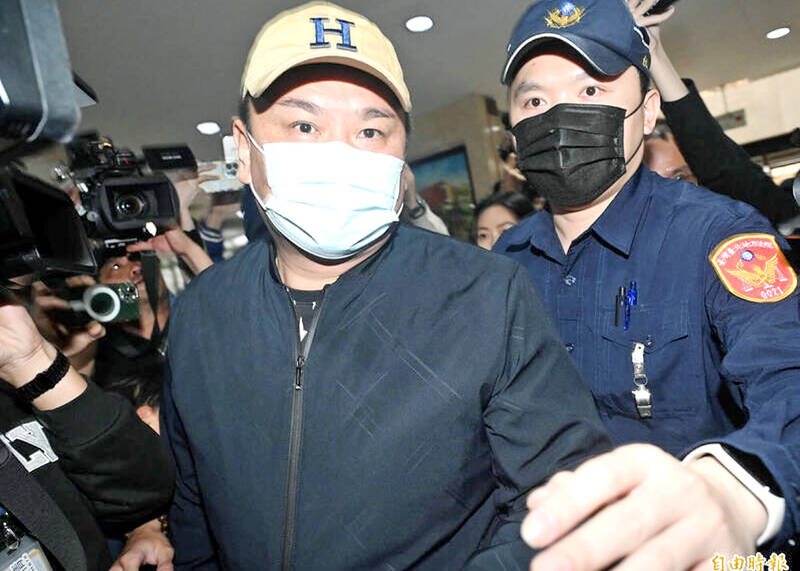Taipei City Councilor Chen Chung-wen (陳重文) was indicted on Friday for allegedly fraudulently obtaining NT$3.21 million (US$98,075) from a government contract.
After several months of investigation, the Taipei District Prosecutors’ Office indicted Chen, 46, who represents Taipei’s Shilin (士林) and Beitou (北投) districts for the Chinese Nationalist Party (KMT), under the Anti-Corruption Act (貪污治罪條例).
The case involves Taiwan Intelligent Fiber Optic Network Consortium (TAIFO), which was awarded a 25-year contract by the Taipei City Government in 2011 to build a fiber optic network in the capital, as part of a smart city project, when Hau Lung-bin (郝龍斌) of the KMT was mayor from 2006 to 2014.

Photo: Chen Tsai-ling, Taipei Times
Recognizing that there were lucrative profits to be gained from TAIFO’s relationship with the city government, Chen and a friend named Kang Li-chi (康立錡) set up a new company last year to partake in the project, the prosecutors said.
Kang was named as its director, although Chen was the real boss, the prosecutors added.
This firm received various contracts connected to TAIFO’s business deals with the city government, prosecutors said.
From April to June last year, Chen pressured the Taipei Department of Social Welfare on multiple occasions to award TAIFO a contract to install cloud-based surveillance systems at the city’s public childcare care centers, prosecutors said.
With the contract awarded to TAIFO, due to Chen’s pressure, the company then subcontracted the project to Kang, who passed it to Vqorder Co, a New Taipei-based company also registered under his name, to carry out the work, prosecutors said.
Through this arrangement, each party involved was able to take a share of the contract, prosecutors said, adding that Chen allegedly made NT$3.21 million in illegal gains through the deal, prosecutors said.
On Friday, Chen and Kang were indicted for corruption and intent to directly or indirectly seek unlawful gains, they added.
Meanwhile, a separate case which began in March involving TAIFO and its supply of surveillance cameras used by the Taipei police is still being investigated, prosecutors said.

Taiwan has received more than US$70 million in royalties as of the end of last year from developing the F-16V jet as countries worldwide purchase or upgrade to this popular model, government and military officials said on Saturday. Taiwan funded the development of the F-16V jet and ended up the sole investor as other countries withdrew from the program. Now the F-16V is increasingly popular and countries must pay Taiwan a percentage in royalties when they purchase new F-16V aircraft or upgrade older F-16 models. The next five years are expected to be the peak for these royalties, with Taiwan potentially earning

STAY IN YOUR LANE: As the US and Israel attack Iran, the ministry has warned China not to overstep by including Taiwanese citizens in its evacuation orders The Ministry of Foreign Affairs (MOFA) yesterday rebuked a statement by China’s embassy in Israel that it would evacuate Taiwanese holders of Chinese travel documents from Israel amid the latter’s escalating conflict with Iran. Tensions have risen across the Middle East in the wake of US and Israeli airstrikes on Iran beginning Saturday. China subsequently issued an evacuation notice for its citizens. In a news release, the Chinese embassy in Israel said holders of “Taiwan compatriot permits (台胞證)” issued to Taiwanese nationals by Chinese authorities for travel to China — could register for evacuation to Egypt. In Taipei, the ministry yesterday said Taiwan

Taiwan is awaiting official notification from the US regarding the status of the Agreement on Reciprocal Trade (ART) after the US Supreme Court ruled US President Donald Trump's global tariffs unconstitutional. Speaking to reporters before a legislative hearing today, Premier Cho Jung-tai (卓榮泰) said that Taiwan's negotiation team remains focused on ensuring that the bilateral trade deal remains intact despite the legal challenge to Trump's tariff policy. "The US has pledged to notify its trade partners once the subsequent administrative and legal processes are finalized, and that certainly includes Taiwan," Cho said when asked about opposition parties’ doubts that the ART was

If China chose to invade Taiwan tomorrow, it would only have to sever three undersea fiber-optic cable clusters to cause a data blackout, Jason Hsu (許毓仁), a senior fellow at the Hudson Institute and former Chinese Nationalist Party (KMT) legislator, told a US security panel yesterday. In a Taiwan contingency, cable disruption would be one of the earliest preinvasion actions and the signal that escalation had begun, he said, adding that Taiwan’s current cable repair capabilities are insufficient. The US-China Economic and Security Review Commission (USCC) yesterday held a hearing on US-China Competition Under the Sea, with Hsu speaking on